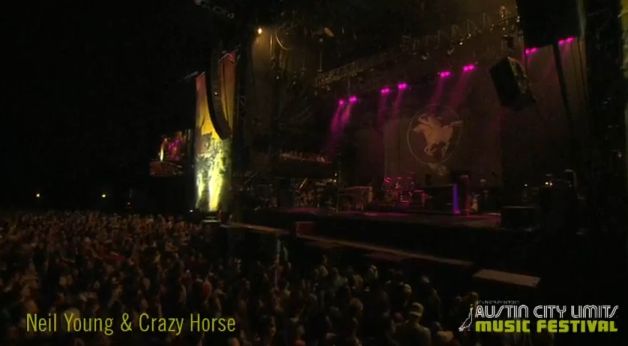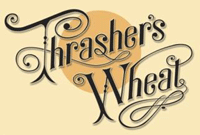‘News / Article’ Articles
this is the default category / most important part of the front-page. Most posts come in as news/articles.
Concert Review: Austin City Limits Festival by Houston Press
Neil Young & Crazy Horse
Bud Light Stage
Austin City Limits Music Festival, Zilker Park
October 13, 2012
With all the members knocking on the door of 70, it would be easy for the youngsters at ACL to call Neil Young and his band Crazy Horse decrepit and foggy. But their blistering set was a brute-force display of proto-grunge and Bernard Shakey hymns to the hard land and the harder life.
Simply put, the band was louder and tighter than most anything else one would see in Zilker Park thus far. Keep in mind that the Iggy & the Stooges’ Sunday-evening set tonight could tie up that score.
Saturday night, festival-goers had two options for evening entertainment: the aggressive history lesson on the Bud Light stage with Young and company, or Jack White’s formidable solo display on the AMD outpost hundreds of yards away. It wasn’t possible to see both, plus I was entrenched in the front of the Crazy Horse crowd early on.
Opening with “Love And Only Love” from 1990’s Ragged Glory, the band raged with Young’s signature stomping and wrenching for ten minutes, before pulling things back for a towering recitation of “Powderfinger,” complete with crazy interplay and feedback.
The thought of the band rehearsing these songs in some rustic barn at full bloody volume makes me giddy. The band is no frills, and compared to the rest of the dress of the festival’s flashy lineup, they looked like roadies or stoner grandpas in comparison. Young threw off his Willie Nelson camp into the photo pit early on, with a fan just losing it from his hands.
Young took on the mournful “The Needle and the Damage Done” alone with an acoustic guitar and a harmonica, thrilling the old stalwart fans in the crowd. With each strum of his guitar, there was history dripping onto the stage.
“Cinnamon Girl” would have been the most immediately recognized song for the wet-behind-the-ears set at the show, Young dedicating it to his wife somewhere backstage.
Seeing Young sans Crazy Horse is only seeing a third of his spirit. The last time I saw Young was at Houston’s Jones Hall on his “Le Noise” tour, a jaunt that saw him alone with just pedals, his prized guitars, and some snarl. Saturday night’s headlining set was the same, just done widescreen and with a lot more smiles.
Young is an act that we have all long waited to make his ACL debut. He was the only glaring hole left in the festival’s 11-year history, and thankfully he filled it and overflowed the empty space that was there.
SET LIST (Courtesy of Sugar Mountain) Love And Only Love Powderfinger Born In Ontario Walk Like a Giant The Needle And The Damage Done Twisted Road Ramada Inn Cinnamon Girl F*!#in' Up Psychedelic Pill Down By The River ENCORE Hey Hey, My My (Into The Black)
Appropriately so, the band launched into “Down By The River”, just paces from the Colorado which cuts through Austin. The crowd was raging for it.
A new song: Singer Without a Song
see article on Human-Highway.org.
Book Review: WHP offers a glimpse of his life, music
Neil Young’s book offers a glimpse of his life, music
By DAVID ULIN
Los Angeles Times
“Waging Heavy Peace: A Hippie Dream”
By Neil Young
Blue Rider Press; 502 pages; $30
NeilYoung’s “Waging Heavy Peace: A Hippie Dream” is surely one of the most idiosyncratic rock star autobiographies ever written.
A 502-page free-form series of digressions, it is by turns exhilarating and enervating, less a memoir than a self-portrait, with all the impressionism that implies.
On the one hand, “Waging Heavy Peace” is a mess — sprawling, improvisational, like a sloppy 40-minute jam on “Like a Hurricane.” But it is also revealing, even at times oddly beautiful, a stream-of-consciousness-meditation on where Young has been, where he thinks he’s going and, perhaps most revealing, where he is right now.
“Not that it matters much,” he writes, “but recently I stopped smoking and drinking. The big question for me at this point is whether I will be able to write songs this way. I haven’t yet, and that is a big part of my life. Of course I am now 65, so my writing may not be as easy-flowing as it once was, but on the other hand, I am writing this book. I’ll check in with you on that later. We’ll see how it goes.”
The smoking to which Young refers is, of course, weed, which he has long regarded as a key to his creativity. As such, his not altogether willing sobriety becomes one of the threads of “Waging Heavy Peace,” a through line that roots the book in the here and now.
Composed in 2011, during a period when Young had stopped making music, the memoir is as much a record of his creative doubts, his fears and uncertainties about growing older, as it is the story of his years with Buffalo Springfield or Crosby, Stills, Nash and Young.
“At this age,” he writes, contemplating another run with Crazy Horse, his longtime backing band, “I think relevancy is the big challenge. We need to be sure the new songs and music are ready and are meaningful to us. They are our ticket, our vehicle to the future, and without the new songs we are just reliving the past.”
As it turns out, the Crazy Horse reunion did happen; Young and the band released a cover record this year, and an album of new songs, “Psychedelic Pill,” comes out at the end of the month.
It is compelling to see a figure as prominent as Young — arguably one of the five or 10 most influential figures in the history of rock ‘n’ roll — express himself in such an unfiltered way.
This off-handed directness has long been the key to Young’s music; he’s as unpretentious as they come. Even “Trans,” his 1982 electronic album, had its roots in day-to-day experience, inspired by his son Ben, who was born with cerebral palsy and requires around-the-clock care.
And yet, Young is mercurial and easily distracted, as evidenced by the peripatetic nature of his career. He followed his most commercial record, 1972’s “Harvest,” with a suite of albums (“Time Fades Away,” “On the Beach,” “Tonight’s the Night”) known among his fans as the “Ditch Trilogy,” for their distance from the middle of the road.
He walked away from every group he ever played with, famously breaking up with Stephen Stills midtour in 1976 by sending Stills a telegram that read, “Funny how some things that start spontaneously end that way. Eat a peach, Neil.”
Tellingly, that anecdote doesn’t appear in “Waging Heavy Peace.” There’s a limit to the art of revelation, it appears. But it remains instructive, suggesting something about Young’s approach to this project as well.
Like his discography, it is a memoir without apparent shape — or more accurately, one whose shape emerges from its shapelessness, from its tendency to wander, from the ebb and flow of Young’s attention, from the play of memory.
In many ways, it unfolds in real time, with ruminations on his sobriety, on extra-musical projects such as the Lincvolt (an electric car) or PureTone (a system for reproducing digital sound in high fidelity) as well as ongoing updates on the book itself.
“I have been clean now for seven months,” he writes in one of the closing chapters. “That is a good long time. I still feel cravings … I haven’t written a song in more than half a year, and that is different for me. Of course I’ve written over ninety thousand words in this book, and that is different for me, too.”









